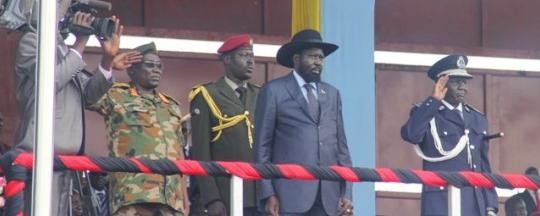A new NGO bill awaiting final approval by South Sudan’s parliament will restrict the number of foreigners allowed to work for relief organizations in the country and require each organization to sign a ‘Country Agreement’ with the government, the terms of which are not specified.
Once enacted, the law will possibly also disallow the NGO Forum, which is a coordination body for national and international aid organizations. The “Non-Governmental Organizatinons Bill, 2015” has already been passed to its final reading in the national parliament.
Any international NGO operating in South Sudan will have to re-register within 3 months of enactment of the bill. In order to do so, the organization will need to conclude a “Country Agreement with Ministry reponsible for Humanitarian Affairs on behave of the Government [sic].”
The bill does not limit the powers of the government with regard to these agrements, except to define Country Agreement as an agreement “intended to regulate the entry and carrying out of voluntary projects by the organization in the Republic of South Sudan.”
Furthermore, the NGO Bill grants national organizations the right to form a ‘forum’ or ‘union’ but omits to grant the same right to international organizations. “Registered national non-governmental organizations may establish a national forum or union for exchange of information and experiences…,” the bill reads (emphasis original).
In terms of staff numbers, the international organizations will have to ensure that not less than 80 percent of total staff are South Sudanese nationals. Although INGOs on average already meet this ratio, the bill also specifies that this ratio must be maintained also at the “managerial” level of employment.
If enforced, this would mean that many foreign relief specialists and managers would have to leave the country. According to the NGO Forum Employment Survey 2013, the ratio of national to international staff in management positions is approximately 1:1, far below the mandated ratio.
Targeting food sources
Foreign relief workers have evacuated from Leer in southern Unity State ahead of a possible government offensive to take the town. Medical group MSF said Saturday it halted services at the hospital citing fears of an “imminent attack on the town of Leer.”
Since beginning its latest offensive, the government has captured territories south of Bentiu, the capital of Unity State. The latest fighting coincides with the peak of the planting season.
Government troop movements were also reported last week near the Jonglei frontline. SPLA sources in Jonglei confirmed receiving orders to attack neighboring rebel areas and occupy them before the start of the rainy season.
A source on the SPLA General Staff explained that the objective is twofold: Firstly, to deny the opposition territorial control in order to bolster the government position at the negotiation table when peace talks resume; secondly, to deny humantiarian aid to the targeted areas.
This plan is informed by a belief that relief food items airdropped by World Food Programme go to opposition forces and not to the hunger-stricken communities, the source said. The plan envisages that if no food is supplied to the rebels, they would be starved and some would eventually surrender.
File photo
Related:
Unity State violence displaces 100,000 people in a single week (8 May)
Kiir calls for new law to control NGOs (20 Apr.)




